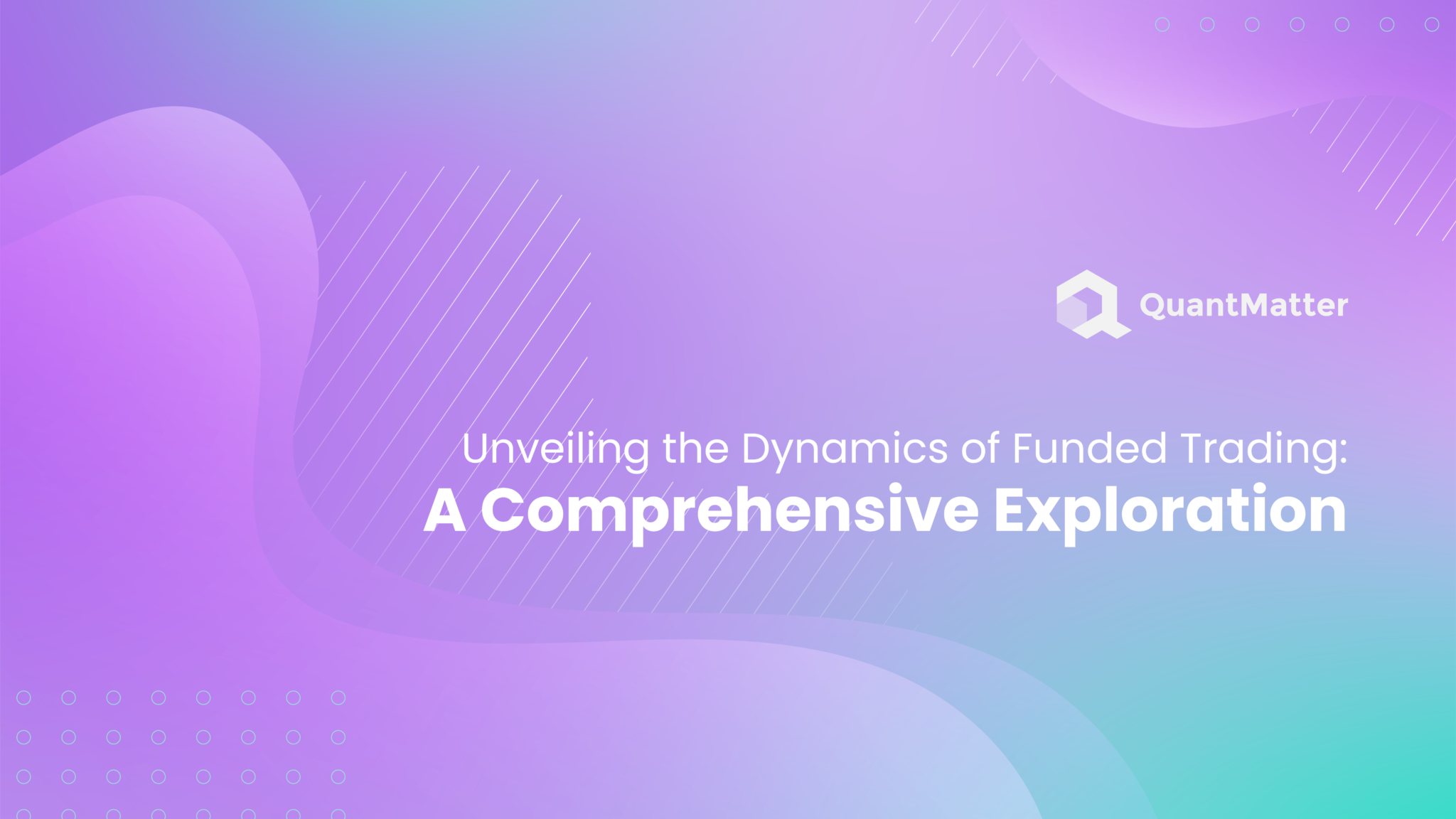
Trading with other people’s money is also a thrilling idea where one can trade without exposing his personal capital. Sustained success of an innovative program can only be achieved through understanding the terms of the funding agreement, which is not just a preliminary issue. Understanding profit sharing agreements, risk management policies, and costs and charges is crucial. Background information is key to making correct decisions, as they know all the rules in place affecting them. They should be able to satisfy their sponsors and other investors as well.
Furthermore, there are no secrets about funded trading because a successful trader will always be ready to learn and improve. The financial markets are highly volatile and subject to changing conditions such as economics, politics, and global issues. However, traders should always remain active by improving their information, perfecting their abilities, and updating their models with new market trends. Such a commitment to continuous education puts the funded traders ahead by enabling them to overcome the current problems and prepare for favorable opportunities to come.
Although funded trading creates opportunities for larger capital and money, it entails complete and careful consideration. Therefore, to be successful in this unique and unusual market space. Traders must be watchful at all times while constantly improving their expertise on the various aspects. They will also have to keep educating themselves since traders learn every step of the way. In this article, we shall dive deep into funded trading as a concept and detail what it entails, why it is beneficial, and issues arising with it.
Understanding Funded Trading

Prop trading, which is also known as funded trading and can be considered a unique way of participating in the financial markets, involves using other people’s money. Underneath this framework, people engage in different financial deals involving others’ money or market-makers. Funded trading is another term used in financial markets, which implies that unlike the usual trading methods, traders are allowed to trade using a large number of other people’s funds, hence increasing their capacity to trade with large positions.
Funded trading is one of the best selling points because it democratizes entry into the market. Such trading firms provide external capital that enables people without huge personal endowments to buy more significant investment opportunities. This democratization facilitates much bigger and more varied participation in trade processes, which is likely to even the playing field for different traders.
Also Read: Market Making: Strategies and Techniques
Further, most funded trades go hand in hand with various structures and rules. Such may be profit-sharing deals, risk management protocols and performance indicators. Traders usually go through a selection process based on their previous performance, risk control abilities, and trading principles. This mechanism is highly selective in order to maintain some sort of compliance with diligence on the trader’s side and the capital provider’s side.
Persons involved in funded trade must be aware that there are risks. The availability of external capital increases traders’ ability to trade but imposes another accountability stage. There is a need for such traders to follow the norms of trade and remain profitable with the funds that they are provided with. If one deviates from the planned strategy or does not appropriately manage its risks, the funding deal may be called off.
Funded trading provides a way for people without large amounts of money to participate in the market. Nevertheless, participants must have a sound comprehension of who assumed some specified responsibilities and risks and are in compliance with acceptable standards to ensure a sustainable relationship with their external investors or trading firm.
Key Components of Funded Trading

In funded trading, traders employ the money offered by outsiders for trading in financial markets. The key components of funded trading typically include:
– Capital Allocation
The allocation of capital has an immense bearing on every activity that transpires in funded trading. Sometimes, traders are given money by investment institutions or trading companies. However, it must be noted that this capital differs from the private funds of traders and serves only for operations on the market. This unique structure makes it possible for people to trade in financial markets using credit that exceeds their individual finances to create bigger and more influential transactions.
In addition, the capital used in funded trading must meet the given stipulations of the outsider investors or the trading houses. The use of these funds is usually subject to certain guidelines concerning the utilization of the capital, risk management procedures, and performance benchmarks that traders must comply with in order to maintain their access to borrowed credit.
– Profit Sharing
The profits sharing agreement that characterises funding arrangements between traders and capital providers is a hallmark of a funded trading arrangement. Profit sharing is done according to this profit-sharing agreement, which defines the manner in which profits derived from profitable trades are shared. Usually, traders get a share of the profits generated, which encourages a direct connection between the trading decision and the financial gain.
In turn, profit-sharing forms an integral part of this business, which motivates traders to make wise decisions and earn profits. This interest’s alignment creates an incentive for traders to get maximum profits, as each trader’s remuneration is closely connected with the efficiency of their trades. The relationship between traders and funders forms a basis for benefiting from mutual gains resulting from profitable trading methods.
– Risk Management
Risk management in funded trading is a crucial concept. While trading on funded accounts, the rules of risk management are very strict and should not be violated at any cost. The regulations aim to guard against exposure to unfriendly market conditions that may potentially result in the depreciation of money contributed by external sources.
Traders are required to operate in predetermined risk ranges by limiting the size of positions and setting maximum drawdown levels, among others. The risk management considerations built into funded trading seek to achieve a balance between saving money and making profits. Risk management emphasizes protecting not only the interests of these external investors and traders but also ensuring that the funded trading relationship is sustainable over a long period of time.
Advantages of Funded Trading

Trading on margin provides various benefits for traders who wish to expand their trading operations with other people’s money. Here are the key advantages:
– Leverage Opportunities
Funded trading is one of the trades that has the unique benefit of providing more leverage than the utilization of personal capital. In financial markets, leverage, which involves controlling a larger market position with a small amount of cash, is like a sword that possesses both edges. Though it can exaggerate profits, it will likewise enhance the prospect of considerable loss. Through funded trading, people are able to achieve greater levels of leverage and, hence, positions much higher than their own money could afford.
Nevertheless, high leverage exposes the need for good risk management. Traders need to realize that increased price movement can have a greater adverse effect on positions and should take appropriate capital allocation actions to avoid this. Traders engaging in funded setups may optimize their returns without exposing themselves to unreasonable risks by managing the tricky trade-off of leverage versus risk appropriately.
– Professional Development
Doing funded trade does not stop only with the profit; it is also a chance to learn about new aspects of the world of finances. Funded trading gives traders hands experience of the real market environment, where they learn not only in theory but also in practice. Such first hand involvement is critical to those who wish to become professionals in the trading business.
Traders are made to improve on their skills, become sharper at analyzing the market, and make sound decisions under the funded trading model. In terms of success, a funded trader’s success is a sign of their professional capability that could earn them more chances in the financial world. Their accumulated knowledge and expertise as traders across different market scenarios contribute to their evolution into seasoned market veterans.
– Diversification of Trading Strategies
The funded traders have an opportunity to diversify their strategies in different markets, hence enjoying a certain degree of flexibility with regard to the trading process. Having the capability to venture into diverse trade methodologies coupled with a multiplicity of asset classes increases flexibility, which is instrumental in the constantly evolving terrain of financial markets. Diversification also reduces the risk of failure in one business unit because good performance in other units will compensate for it.
The traders will be able to try out different approaches, such as day trading or swing trading, on a wide range of commodities. By diversifying a trader’s skill-sets, this offers insulation against market volatility. The funded trading model promotes the continuous search for viable strategies that help enhance the skillset that traders build on throughout their trading lives.
3 Considerations for Prospectively Funded Trading
Prospective traders planning to engage in funded trading opportunities must critically assess the different aspects so as to create an equitable partnership. Here are key considerations:
1. Leverage Opportunities
Another significant merit of funded trading is that its users have more leverage than those utilizing their own funds. In the financial markets, leverage is a two-way knife. Though it has the potential to increase profits, it also increases the chance of massive losses. With funded trading, one can access more substantial leverage upfront, allowing them to hold bigger stakes in a trade that might not be possible with individual resources.
While the increased leverage highlights the need for efficient risk management systems,. However, market movements have a more magnified effect on traders’ positions. Therefore, they should be more vigilant in protecting the capital for allocated trading. Traders who work on leverage-funded strategies are able to optimize their profit capacity by maneuvering through that thin line between leverage and the attendant risks.
Also Read: Automatic Market Makers : Things You Should Know
2. Professional Development
Supported trading goes beyond the short-term financial benefits; it becomes a platform for career development within the financial community. Trading with funded arrangements exposes traders to the live market and creates a realistic environment beyond mere book knowledge. Individuals desirous of pursuing a professional trader career need to grasp this hands-on experience
The funded trading model motivates traders towards fine-tuning skills, developing sharp market foresight, and making better judgments. Proficient traders can succeed in funded trading and eventually be offered more lucrative positions within the industry based on this success. In the process of trading in different market situations, they gain years and years of experience, which contributes to their maturity as experienced people.
3. Diversification of Trading Strategies
This offers funded traders the opportunity to engage in different trading tactics in diverse markets since they are not limited. This attribute enables various modes of trade and allows for greater flexibility, which is an important aspect of changing the financial markets’ landscape. Diversification is a risk management approach that reduces the negative effects of bad returns in one segment of business by compensating through good performance in the other parts.
Thereby, traders are afforded the chance to try out various strategies, such as day trading or swing trading. Also, it provides room for exploration in various markets involving different financial items. Such diversification of the trader’s skills increases his strength to withstand the uncertainty of the markets. Through this, the funded traders are able to explore strategies as they refine their approach towards more adaptable and robust trading skills.
Conclusion
Funded trading is a special path that enables people to have large amounts of money and increase income in stock markets. Although it offers traders an opportunity to expand their market presence so as to access increased opportunities, it is important to note that any success in funded trading requires proper discipline, a thorough understanding of all the terms, and a perpetual willingness to further develop skills and knowledge.
Funded trading is attractive because it helps to provide more equal opportunities by enabling people to use capital that is more than their own money. The increased trading capital allows traders to go for large trades at a time, which may even double their profits. Nevertheless, such a prospective for enhanced profits comes along with additional obligations. When traders trade on a margined arrangement, it means that they get more capital to work with and, therefore, must be extra cautious as more capital leads to greater risk.
Funded trading requires discipline, which is key to success. Discipline in trading strategy execution, managing risks strictly, and sticking to target-oriented trading are very essential. Traders should be mindful to avoid being carried away by spontaneous decisions or emotional reactions based on changing markets and understand that an objective approach is crucial for achieving sustainable growth.
Disclaimer: The information provided by Quant Matter in this article is intended for general informational purposes and does not reflect the company’s opinion. It is not intended as investment advice or a recommendation. Readers are strongly advised to conduct their own thorough research and consult with a qualified financial advisor before making any financial decisions.

I craft stories that make complex ideas clear. I simplify the blend of data science, machine learning, and crypto trading, showcasing how advanced tech and quantitative models analyze data for informed trading choices. Join me in exploring the realm of quantitative trading, where my narratives make intricate concepts easy to grasp.
- Alifia Berizkyhttps://quantmatter.com/author/alifia-berizky/
- Alifia Berizkyhttps://quantmatter.com/author/alifia-berizky/
- Alifia Berizkyhttps://quantmatter.com/author/alifia-berizky/
- Alifia Berizkyhttps://quantmatter.com/author/alifia-berizky/
